|
|
|
Sort Order |
|
|
|
Items / Page
|
|
|
|
|
|
|
| Srl | Item |
| 1 |
ID:
155137


|
|
|
|
|
| Summary/Abstract |
Treating the threat of climate change in the Caribbean as a case study instructive for responses globally, this article examines the social and political relations of climate change. It argues for an analysis taking into account the ways in which the histories of imperialism and colonialism have shaped contemporary global ‘development’ pathways. The article charts how Caribbean vulnerability to temperature rises of more than 1.5°C of warming comprise an existential threat structured by contemporary social relations that are imperialist in character. Hope can be taken from a politics of climate justice which acknowledges the climate debts owed to the region.
|
|
|
|
|
|
|
|
|
|
|
|
|
|
|
|
| 2 |
ID:
117010
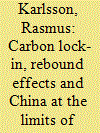

|
|
|
|
|
| Publication |
2012.
|
| Summary/Abstract |
From the beginning, the statist frame of the Kyoto Protocol has invited a focus on national carbon budgets and piecemeal mitigation within rich countries. Despite the Clean Development Mechanism and other efforts to diffuse low carbon technologies to developing countries, China has over the last decades continued to construct hundreds of new thermal coal power plants leading not only to skyrocketing emissions in the present but also to long-term carbon lock-in. In light of this, China is likely to continue to put strong upward pressure on global emissions for many decades to come. Ignoring the seriousness of this situation, many rich countries have persisted to seek marginal improvements to intermittent low-energy sources such as wind power rather than taking the lead in developing breakthrough baseload technologies such as nuclear fusion. This paper argues that only such high-energy technologies, if made significantly cheaper than any fossil alternatives, will be capable of breaking the current carbon lock-in process in China and other developing countries.
|
|
|
|
|
|
|
|
|
|
|
|
|
|
|
|
| 3 |
ID:
181526


|
|
|
|
|
| Summary/Abstract |
This article looks at the current state of carbon removal approaches and some of the politics that surround them. It outlines what carbon removal is, charts some of the major challenges and controversies, and sketches some of the work needed to ensure that carbon removal developments are attentive to environmental sustainability and social justice. It also examines some of the major carbon removal options that are either in development or in discussion, starting with biological approaches and then looking at engineered options.
|
|
|
|
|
|
|
|
|
|
|
|
|
|
|
|
| 4 |
ID:
161651
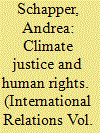

|
|
|
|
|
| Summary/Abstract |
Climate change as well as climate policies can have adverse effects on the human rights of certain population groups – and can exacerbate situations of injustice. As it stands today, the human rights regime is not set to sufficiently address these situations of climate injustice. In this article, I suggest a systematization of the normative climate justice literature that can be used as an analytical framework to evaluate current developments in human rights law and policy, and their potential to diminish inter-national, intra-societal and inter-generational climate injustice. I argue that further advancing procedural and substantive human rights obligations and corresponding enforcement mechanisms constitute one important way of establishing climate justice practices. Moreover, I suggest that the normative climate justice literature can be fruitfully used in International Relations to evaluate policy developments at the intersection between climate change and other policy fields.
|
|
|
|
|
|
|
|
|
|
|
|
|
|
|
|
| 5 |
ID:
162616
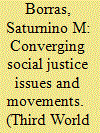

|
|
|
|
|
| Summary/Abstract |
We argue that the multiple contemporary converging crises have significantly altered the context for and object of political contestations around agrarian, climate, environmental and food justice issues. These shifts affect alliances, collaboration and conflict among and between state and social forces, as well as within and between movements and societies. The actual implications and mechanisms by which these changes are happening are empirical questions that need careful investigation. The bulk of our discussion is dedicated to the issue of responses to the crises both by capitalist forces and those adversely affected by the crises, and the implications of these for academic research and political activist work. More specifically, we explore four thematic clusters, namely (1) class and intersectionality; (2) sectoral and multisectoral issues and concerns; (3) importance of immediate, tactical and concrete issues of working people; and (4) links between national and global institutional spaces and political processes. We know only a little about the questions we framed here, but it is just enough to give us the confidence to argue that these questions are areas of inquiry that deserve closer attention in terms of both academic research and political debates and actions.
|
|
|
|
|
|
|
|
|
|
|
|
|
|
|
|
| 6 |
ID:
188906
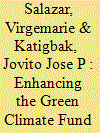

|
|
|
|
|
| Summary/Abstract |
The prevailing issues in the Green Climate Fund on implementation and governance can be seen as symptoms of the ills of the international climate finance architecture. These are compounded by the inadequate financial support provided by developed countries to developing countries and the low volume of funding channelled to adaptation projects. Evidently, the cited issues highlight the need to fully integrate the principles of justice and equity into the global climate change regime. Thus, this policy brief discusses the key challenges related to climate finance, and outlines several options and considerations on improving the Green Climate Fund operations using a climate justice lens. This paper intends to take a more normative and ethical discussion on the topic of climate finance.
|
|
|
|
|
|
|
|
|
|
|
|
|
|
|
|
| 7 |
ID:
188916
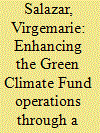

|
|
|
|
|
| Summary/Abstract |
The prevailing issues in the Green Climate Fund on implementation and governance can be seen as symptoms of the ills of the international climate finance architecture. These are compounded by the inadequate financial support provided by developed countries to developing countries and the low volume of funding channelled to adaptation projects. Evidently, the cited issues highlight the need to fully integrate the principles of justice and equity into the global climate change regime. Thus, this policy brief discusses the key challenges related to climate finance, and outlines several options and considerations on improving the Green Climate Fund operations using a climate justice lens. This paper intends to take a more normative and ethical discussion on the topic of climate finance.
|
|
|
|
|
|
|
|
|
|
|
|
|
|
|
|
| 8 |
ID:
181062
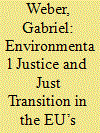

|
|
|
|
|
| Summary/Abstract |
The European Union (EU) is globally recognised as a sustainability leader and has implemented various climate policies such as the European Green Deal. However, it is also one of the largest importers of fossil fuel resources from developing countries, as in the case of coal from Colombia. From a political ecology and environmental justice perspective, it is possible to argue that the EU has benefited for many years from cheap Colombian coal, while the local population has suffered from the related social and environmental impacts. Colombia and Europe are connected not only through ‘ecologically unequal exchanges’, but also through anti-coal activist networks, which highlights the challenges ahead for the EU and its (former) suppliers of fossil fuels in terms of sustainability transitions.
|
|
|
|
|
|
|
|
|
|
|
|
|
|
|
|
| 9 |
ID:
171755
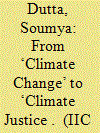

|
|
|
| 10 |
ID:
180238
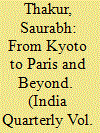

|
|
|
|
|
| Summary/Abstract |
Anthropogenic climate change has emerged as the most disruptive socio-political issue in the last few decades. The Kyoto Protocol’s failure to curb the rising greenhouse gases emissions pushed the UNFCCC-led negotiations towards a more flexible, non-binding agreement at the Paris COP21 meeting in 2015. The Paris Agreement’s hybrid approach to climate change governance, where flexible measures like the nationally determined commitments are balanced against the ambition of limiting the global temperature within the two-degree range, ensured the emergence of an increasingly complex and multi-stakeholder climate change regime. The article outlines the roadmap of the transition from the top-down approach of Kyoto Protocol to the legally non-binding, bottom-up approaches adopted for the post-Paris phase. The article outlines the post-Paris developments in international climate politics, which hold long-term geopolitical and geoeconomic implications. The article focuses on the fundamental shifts and balances within the UNFCCC architecture and examines the four fundamental features of this transition—the interpretation of differentiation and common but differentiated responsibilities, the evolving role of emerging economies in the negotiations, the rising profile of non-party stakeholders in shaping the climate action strategies and the emergence of climate justice movements as an alternate site of climate action.
|
|
|
|
|
|
|
|
|
|
|
|
|
|
|
|
| 11 |
ID:
187572


|
|
|
|
|
| Summary/Abstract |
India has been playing a leading role in the climate change negotiations and has successfully pleaded the case of other developing countries, LDCs and Small Island developing Countries. She has well articulated the issues and concerns of her own interests as well as those of other developing countries over the years in these negotiations. India has realized the urgency and complexity involved in these negotiations.
|
|
|
|
|
|
|
|
|
|
|
|
|
|
|
|
| 12 |
ID:
137269


|
|
|
|
|
| Summary/Abstract |
Institutional mechanisms for administering international climate finance constitute key components of an effect global climate regime, and the Green Climate Fund represents what promises to become the most important such mechanism. As the Fund begins to serve its function of transferring economic resources from developed to developing countries to support mitigation and adaptation activities, it faces several obstacles. Since contributions to the Fund by states or private parties are voluntary, they are not necessarily based on the UN Framework Convention on Climate Change’s “common but differentiated responsibilities” principle. Its governing instrument also departs from UNFCCC principles. In addition, the Fund faces a significant ambition gap in pledges to fund its operations. By instantiating several informal means of applying climate justice norms to assessments of national contributions to climate finance, some of this resistance might be overcome, increasing support for the Fund and, with this, increasing prospects for reaching consensus on a new climate treaty architecture at COP 21.
|
|
|
|
|
|
|
|
|
|
|
|
|
|
|
|
| 13 |
ID:
155138


|
|
|
|
|
| Summary/Abstract |
While neo-imperialism is becoming increasingly discussed within academia and by public intellectuals, this paper hypothesises that, due to resource needs of social movement organisations, neo-imperialism is not a major diagnostic frame used by international solidarity organisations in the Global North. We tested this hypothesis by examining diagnostic collective action frames used online by 30 organisations across three solidarity movement issues: climate justice, refugee solidarity and debt relief. While the frame was infrequently used across the organisations, results reveal that those organisations that did utilise the frame with some regularity had constituencies that have suffered from historical forms of imperialism. A qualitative analysis was used to locate the contexts in which the frame was used and the prominence these uses had within the organisations’ public broadcasting.
|
|
|
|
|
|
|
|
|
|
|
|
|
|
|
|
| 14 |
ID:
161934


|
|
|
| 15 |
ID:
193255


|
|
|
|
|
| Summary/Abstract |
Article 8 of the Paris Agreement introduces obligations upon the Parties to the Agreement “with respect to Loss and Damage associated with adverse impacts of climate change.” According to Paragraph 52 of the Conference of the Parties’ Decision, Article 8 is not a basis for liability or compensation. Therefore, the problem is whether violation of obligations leads to a state responsibility. Using a dogmatic method, this research contends that “recognizing the significance of averting, minimizing, and addressing Loss and Damage” means acceptance of responsibility for a breach of obligations. Although the means of seeking reparation would not be compensation, States are obliged to eliminate sources of damage and take precautionary measures to address loss and damage. Notwithstanding this, placing the issue of loss and damage under the Agreement into a separate article can reflect to a great extent the significance of the matter.
|
|
|
|
|
|
|
|
|
|
|
|
|
|
|
|
| 16 |
ID:
162625


|
|
|
|
|
| Summary/Abstract |
Peasants and rural communities are on the front lines of most climate catastrophes taking place nowadays worldwide; at the same time, we have been the ones taking care of our common planet over generations. This article begins with a brief overview of the current situation of land use in the world today and links it to climate issues. It then describes some of the solutions to climate threats being negotiated between national governments and the private sector. It then highlights solutions that communities are already implementing and concludes with the reasons why systemic change is needed in order to achieve agrarian and climate justice.
|
|
|
|
|
|
|
|
|
|
|
|
|
|
|
|
| 17 |
ID:
174341
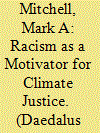

|
|
|
| 18 |
ID:
183867
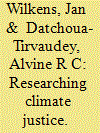

|
|
|
|
|
| Summary/Abstract |
This article addresses the broader question of the special issue by reflecting on the coloniality of knowledge production in a context of global climate governance. Drawing on the rationale of the special issue, we highlight key dynamics in which knowledge shape climate policies and propose a decolonial approach at the nexus of academic knowledge production and policy formation by accounting for diverse ways of knowing climate justice. To this end, the article asks how to develop a decolonial approach to researching climate justice in order to identify the meaning-in-use of climate justice by affected people in what we describe as sensitive regions of the Arctic and the Mediterranean. To this end, the article develops a research design that accounts for diverse ways of knowing. The article proceeds as follows: first, we will discuss how diverse ways of knowing are related to global climate governance and climate justice; second, we outline our practice-based research framework that addresses research ethics, decolonial approaches and norm contestation; and third, we discuss how our approach can inform not only the co-production of research in climate governance, but also current debates on climate justice.
|
|
|
|
|
|
|
|
|
|
|
|
|
|
|
|
| 19 |
ID:
181530


|
|
|
|
|
| Summary/Abstract |
A widespread failure to recognize the social and political-economic causes of climate-related crises is an erasure of history that hides potential solutions and absolves guilty parties of responsibility. This blocking out of causality is perpetuating slow and silent violence against present and future generations. These erasures are illustrated by two short cases: the causes of famine and dislocation in the Sahel, and the causes of farmers’ suicides in India. The essay highlights the need to recognize histories of exploitation, and introduces the “Exploiter Pays Principle,” in order to deliver justice in climate policymaking.
|
|
|
|
|
|
|
|
|
|
|
|
|
|
|
|
|
|
|
|
|